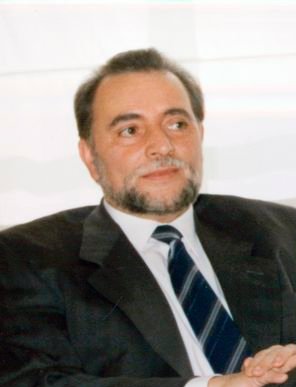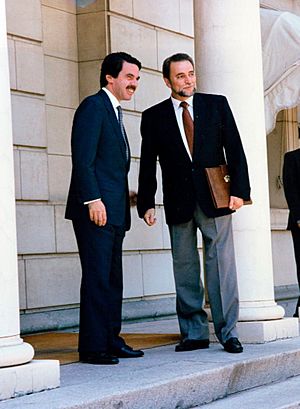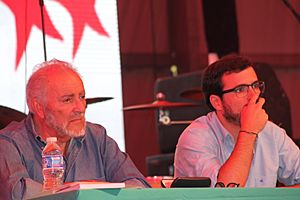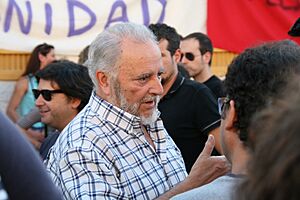Julio Anguita facts for kids
Quick facts for kids
Julio Anguita
|
|
|---|---|
 |
|
| Coordinator of United Left | |
| In office 1 November 1989 – 29 October 2000 |
|
| Preceded by | Gerardo Iglesias |
| Succeeded by | Gaspar Llamazares |
| Secretary General of the Communist Party of Spain | |
| In office 21 February 1988 – 7 December 1998 |
|
| Preceded by | Gerardo Iglesias |
| Succeeded by | Francisco Frutos |
| Mayor of Córdoba | |
| In office 18 April 1979 – 1 February 1986 |
|
| Preceded by | Antonio Alarcón Constant |
| Succeeded by | Herminio Trigo |
| Member of the Congress of Deputies | |
| In office 21 November 1989 – 5 April 2000 |
|
| Constituency | Madrid |
| Member of the Parliament of Andalusia | |
| In office 22 June 1986 – 21 November 1989 |
|
| Constituency | Córdoba |
| Personal details | |
| Born | 21 November 1941 Fuengirola, Málaga, Spain |
| Died | 16 May 2020 (aged 78) Córdoba, Spain |
| Political party | PCE (1972–2020) IU (1986–2020) |
| Children | Julio Anguita Parrado (1971–2003) Ana Anguita Parrado |
| Alma mater | University of Barcelona |
| Occupation | Politician, teacher |
| Nickname | El califa rojo |
Julio Anguita González (born 21 November 1941 – died 16 May 2020) was an important Spanish politician and historian. He served as the Mayor of Córdoba from 1979 to 1986. He also led the political group United Left (IU) from 1989 to 1999 and was the Secretary-General of the Communist Party of Spain (PCE) from 1988 to 1998. Because of his strong influence and how popular he was in Córdoba, people called him el califa rojo, which means the red Caliph.
Who Was Julio Anguita?
Julio Anguita was born in Fuengirola, Málaga, Spain, on 21 November 1941. His family had a military background. He first studied to become a teacher. Later, he earned a degree in history from the University of Barcelona.
In 1972, Anguita joined the Communist Party of Spain (PCE). At that time, the party was not allowed by the government, so it was "clandestine" (secret). Five years later, he became a member of the Central Committee of the Communist Party of Andalusia (PCA).
Becoming Mayor of Córdoba
In 1979, Julio Anguita was elected Mayor of Córdoba. This was during the first local elections after Spain became a democracy again. He won with a clear majority, meaning he had more than half the votes. Córdoba became the first major city governed by Communists since the Second Spanish Republic.
As Mayor, Anguita helped bring democratic order to the city. He was very popular and was reelected in 1983 with an even bigger majority. This is when he earned his famous nickname, the Red Caliph. During his second term, he asked UNESCO to declare the Mosque–Cathedral of Córdoba a World Heritage Site. This important recognition happened in 1984.
In 1986, he decided to step down as Mayor. Soon after, he became a candidate for the United Left (IU) in the regional elections for Andalusia. His party won 19 seats, becoming the third strongest political group in the Parliament of Andalusia.
Leading the Communist Party and United Left

In February 1988, Julio Anguita was chosen as the Secretary General of the Communist Party of Spain. The next year, he became the leader of United Left. He ran for Prime Minister in the 1989 general election, and his party won 17 seats in the Congress of Deputies. He also ran in the 1993 and 1996 elections, which were very successful years for United Left.
Anguita believed that political agreements with other parties, like the PSOE, should be based on specific plans, not just general alliances. He famously said, "programa, programa, programa" (program, program, program), meaning that the political program was the most important thing.
He left his leadership roles due to health issues. In 1998, Francisco Frutos took over as Secretary General of the Communist Party. In 2000, Gaspar Llamazares replaced him as the General Coordinator of United Left.
Later Years and Public Life
After leaving politics, Julio Anguita went back to his job as a history teacher. He even gave up the lifetime pay he could have received as a former member of parliament.
He continued to be active in public discussions. In 2005, he wrote a document calling for the Communist Party to be "re-founded." He talked about the problems caused by the fall of the Soviet Union and how some groups on the Left had become too accepting of capitalism.
In 2012, during a time of economic crisis in Spain, he helped start a social movement called "Civic Front 'We are Majority'." This group aimed to bring together people affected by the crisis and government spending cuts.
Anguita often appeared on political TV shows. His last interview was on 8 May 2020, just before he was admitted to the hospital. He spoke about the importance of everyone living well during the pandemic.
His Death
Julio Anguita passed away on 16 May 2020, after being hospitalized for a heart attack. His death was a sad moment for Spanish politics. Many leaders, including Prime Minister Pedro Sánchez, expressed their sorrow and remembered his strong beliefs and dedication.
His Ideas and Beliefs

Julio Anguita had strong political views. He believed in the "two shores theory," which meant there were clear differences between parties like the People's Party (PP) and the Spanish Socialist Workers' Party (PSOE) on one side, and United Left on the other.
He was against the signing of the Treaty of Maastricht in 1992, which created the European Union and the Euro currency. He later said that the Euro was "a mix of very different economies" where Germany, as a strong economy, benefited the most.
Anguita was a strong supporter of a "Third Spanish Republic." He believed this new republic should be "transversal," meaning it should include ideas from both the political right and left.
He also spoke about the situation of Catalan independence leaders. He believed they were political prisoners and that a vote by the people was the best way to solve the conflict.
Personal Life
Julio Anguita married Antonia Rojas Parrado in 1969. They had two children, Ana Anguita Parrado and Julio Anguita Parrado. They divorced in 1977. In 2007, he married María Agustina Martín Caño.
His son, Julio Anguita Parrado, was a journalist. He sadly died on 7 April 2003, while reporting from the Iraq War.
Publications
Julio Anguita wrote several books. His first book, Corazón Rojo (Red Heart), was published in 2005. In 2007, he wrote the introduction for La Globalización Neoliberal y sus repercusiones en la educación (Neoliberal Globalization and its impact on education). In 2008, he published El Tiempo y la Memoria (Time and Memory) with journalist Rafael Martínez Simancas.
See also
 In Spanish: Julio Anguita para niños
In Spanish: Julio Anguita para niños
 | John T. Biggers |
 | Thomas Blackshear |
 | Mark Bradford |
 | Beverly Buchanan |


